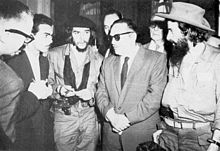Manuel Urrutia
Manuel Urrutia Lleó (born December 8, 1901 in Yaguajay , Las Villas , † July 5, 1981 in New York City , USA ) was a judge and the first President of the Republic of Cuba after the revolution of 1959 .
Manuel Urrutia took part in the resistance against the Cuban dictators Gerardo Machado and Fulgencio Batista . On March 14, 1957, in his capacity as judge in the eastern province of Oriente, he acquitted 150 accused revolutionaries on the grounds that they had exercised their constitutional rights to fight against the illegal seizure of power by Batista.
After the Cuban Revolution of 1959, Urrutia was the first president of the revolutionary government (January 3, 1959 to July 17, 1959). In the revolutionary government he represented the bourgeois camp. One of his first decrees as president was the nationalization of the casinos and hotels in Cuba. As a result, American bullies like Meyer Lansky were deprived of their business base, who then left the island. He spoke out in favor of the early holding of free elections and was against the participation of communists in the revolutionary government, since the communist party had not taken part in the fight against Batista. After Fidel Castro assumed the post of Prime Minister in February, the two main figures in the government soon developed increasing disagreements over the course of government.
Using his enormous personal popularity, Fidel Castro urged Urrutia to resign by accusing him of acts "which bordered on treason " in a high-profile televised speech in support of his own resignation from the post of prime minister on July 17 . In the address, Castro accused Urrutia of hindering the affairs of government by suspecting the government of "without any evidence" of communism , but that neither the revolutionary movement was communist nor Castro himself was communist. Manuel Urrutia submitted his resignation that same night and found asylum in the embassy of Venezuela . As his successor as President of the Republic of Cuba, the longtime activist of the Communist Party of Cuba Osvaldo Dorticós Torrado was installed.
A little later, Urrutia emigrated to the USA, where he worked as a Spanish teacher in the New York borough of Queens .
Web links
- The Political End of “President” Urrutia 1993 by Robert E. Quirk on www.fiu.edu (English)
literature
- Julia E. Sweig: Inside the Cuban Revolution: Fidel Castro and the Urban Underground , Harvard University Press 2002, ISBN 978-0674008489 (English)
| personal data | |
|---|---|
| SURNAME | Urrutia, Manuel |
| ALTERNATIVE NAMES | Urrutia Lleó, Manuel |
| BRIEF DESCRIPTION | Cuban politician |
| DATE OF BIRTH | December 8, 1901 |
| PLACE OF BIRTH | Yaguajay , Las Villas , Cuba |
| DATE OF DEATH | 5th July 1981 |
| Place of death | New York , USA |

